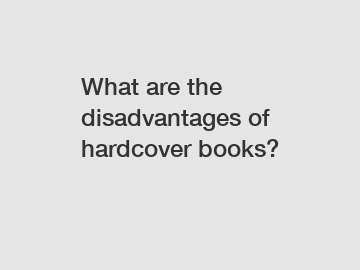What are the disadvantages of hardcover books?
In the age of digitalization and e-readers, the nostalgic charm of holding a hardcover book in our hands is undeniable. The weight, the smell, and the feeling of flipping through beautifully crafted pages evoke a sense of satisfaction that ebooks simply cannot replicate. However, as with anything in life, hardcover books come with their own set of disadvantages that are worth considering. In this blog, we aim to shed light on some of these drawbacks, providing an objective analysis of the disadvantages of hardcover books.
1. Cost:
Hardcover books tend to be substantially more expensive than their paperback or ebook counterparts. The extra production costs involved in printing, binding, and designing hardcovers contribute to the higher price tag. For avid readers or students on a limited budget, purchasing multiple hardcover books can be an expensive endeavor. This price difference makes ebooks and paperbacks a more viable and cost-effective option for many book lovers.

2. Portability:
Another potential downside of hardcover books lies in their weight and size. Due to their rigid design, hardcovers are heavier and bulkier than their paperback equivalents. This makes them less portable and inconvenient to carry around, especially when traveling or commuting. In contrast, ebooks and pocket-sized paperbacks offer a hassle-free reading experience, easily fitting into bags or pockets, thus overcoming issues of bulkiness and weight.
3. Limited Availability:
While certain books may release in hardcover format before their paperback versions, it's worth noting that not all titles are initially published in hardcover. Some books, especially those from independent or niche authors, may only be released as ebooks or paperbacks. Consequently, hardcover enthusiasts may find themselves unable to access certain works in their preferred format due to limited availability.
4. Storage Space:
Hardcover books take up more space on bookshelves, making them less practical for individuals with limited storage options. This is especially true for those living in small apartments or dormitories. The sheer size of hardcovers can make organizing and displaying one's book collection a challenge. With ebooks, however, one can store thousands of books on a single device, eliminating storage concerns altogether.
5. Deterioration and Damage:
Hardcover books, while sturdy, are prone to wear and tear over time. The binding can become loose, pages can stick together, and covers can get scratched or damaged. Moreover, exposure to moisture or sunlight can cause fading, warping, or discoloration, diminishing the longevity of such books. In contrast, ebooks are immune to physical deterioration, and even if your device breaks, your digital library remains unaffected and can be accessed from any new device.
6. Environmental Impact:
Book enthusiasts who prioritize sustainability may find hardcover books less appealing due to their impact on the environment. The production of hardcovers involves cutting down trees for paper, consuming energy for printing, and generating waste during the manufacturing process. Additionally, transportation of physical books contributes to carbon emissions. Ebooks, on the other hand, have a significantly lower carbon footprint, as they require no paper, printing, or transportation.
Conclusion:
While hardcover books offer undeniable aesthetic and tactile pleasures, it's vital to acknowledge their disadvantages. High costs, limited availability, portability issues, storage concerns, susceptibility to damage, and environmental impact are all factors to consider when choosing your preferred reading format. Ultimately, the decision lies with each individual, weighing their personal preferences against the practicalities and potential disadvantages associated with hardcover books. Fortunately, in an era where digital alternatives are readily available, readers can now enjoy the best of both worlds.
Want more information on cnprint, gold foil hardcover book printing, embossed hardcover book? Feel free to contact us.


